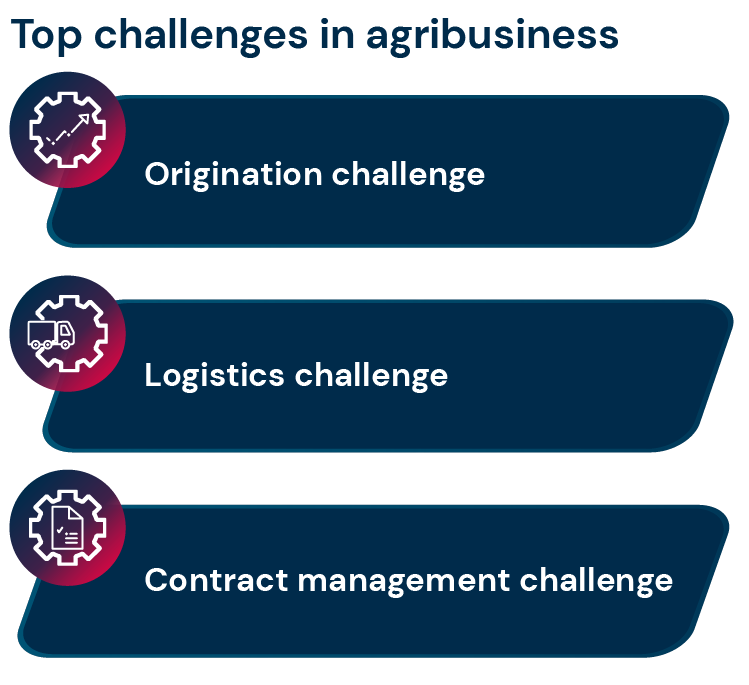The trade that nourishes the world, agribusiness, can be an intricate, complex and exciting industry to be in. With many key stakeholders, a myriad of factors affecting the crop, and storage and transport logistics to take care of, it’s a mystery that the output of such a deeply challenging process flow is so readily-available at neighborhood grocery stores.

Navigating hurdles in agribusiness and commodity trading
The trade that nourishes the world, agribusiness, can be an intricate, complex and exciting industry to be in. With many key stakeholders, a myriad of factors affecting the crop, and storage and transport logistics to take care of, it’s a mystery that the output of such a deeply challenging process flow is so readily-available at neighborhood grocery stores.
While agribusinesses can cloak away the challenges from the end customer, traders and businesses have to face these tedious obstacles every day. Having an efficient Commodity Trading and Risk Management (CTRM) software can be highly beneficial in this regard. In this blog we take a look at the different trading related challenges that businesses in grains and agriculture can face at different stages, and how to overcome them.

Origination
Challenge:
The process of procuring grain involves various obstacles for grain companies such as dealing with procurement challenges, engaging in hedging activities, getting the best grain quality, and acquiring quotes from farmers at the right time. To secure prices before crops are harvested, grain futures are utilized for trading, which are pre-agreed contracts for the delivery of grains or grain products at a fixed price on a particular date. The use of grain futures is crucial since they help farmers secure prices beforehand.
How a cloud-based CTRM can help:
To get the right quotation at the right time, it’s essential to act fast when it comes to grains futures. Having a cloud based CTRM solution that can address the needs of agriculture and softs industry. It can offer the flexibility to configure multiple trading books, each of them reflecting the hedging market to be used or a proxy of that hedging market.
Logistics
Challenge:
Efficiently controlling the entire process of goods transportation, from farm to silos to shipping to storage and delivery, can be a challenging task. Unforeseen occurrences such as severe weather, geopolitical instability, pandemics, and civil unrest pose serious threats to supply chain management. Agribusiness enterprises need to constantly monitor and swiftly respond to any disruptions to prevent crop loss.
How a cloud-based CTRM can help:
With a SaaS CTRM solution, it becomes possible for users to keep a digital track of the movement of goods, in addition to delays and deviations; all while keeping an eye on the accrual adjustments linked to changes in route and path.
Contract management
Challenge:
Capturing purchase and sales contracts, and accounting for specific scenarios, is a task regularly undertaken by companies within the grain industry. However, this process can prove to be arduous, given the potential for inaccuracies. It’s important that these businesses capture contract details correctly, factoring in variations in price, variations, multiple products and shipment details. The grain industry is subject to a number of complexities, given the numerous ways in which it may be transported, stored, and exchanged before reaching the end customer. Notably, the bill of lading is a prime example of a document that accompanies freight, outlining the terms of agreement between shipping entities and carriers during transit. Properly managing such documentation is of paramount importance.
How a cloud-based CTRM can help:
An end-to-end solution for managing the handling of grain in terminal and country silos can prove highly advantageous for grain companies. By implementing the cloud-based CTRM software, they gain the ability to oversee every aspect of physical operations, such as stock management, cargo receipt, shipment, and billing, regardless of mode of transportation, including road, rail, and vessel shipping.
To succeed in the commodity trading business, agribusinesses require effective trading strategies. This involves understanding market trends, identifying opportunities, and creating a solid trading plan that takes into account all relevant factors including supply chain risks, price volatility, and global trade dynamics. Trading strategies must be flexible and adaptable to changing market conditions.
To sum up, agribusinesses face numerous challenges when it comes to the commodity trading of agricultural produce. They must navigate through difficulties related to origination, logistics, contract management and more. Overcoming these challenges requires a proactive approach, clear communication, and rapid response to changing market conditions. Companies that are adept in handling these challenges can better manage their business risks and gain profits by capitalizing on opportunities. To get an in-depth understanding of this topic, read Eka’s latest free eBook.
Other resources

Addressing top challenges in grain trading companies
Crops and grains are the backbone of the agricultural market. However, grain trading companies can face a myriad of obstacles in every aspect of grain trade, including origination, logistics, contract management and warehouse management.

Leading global coffee merchant digitalizes operations with Eka’s CTRM solution
The customer is a leading global coffee merchant who deals with a range of types and grades of coffee from around the world.

Crops and grains are the backbone of the agricultural market. However, grain trading companies can face a myriad of obstacles in every aspect of grain trade, including origination, logistics, contract management and warehouse management.

The customer is a leading global coffee merchant who deals with a range of types and grades of coffee from around the world.